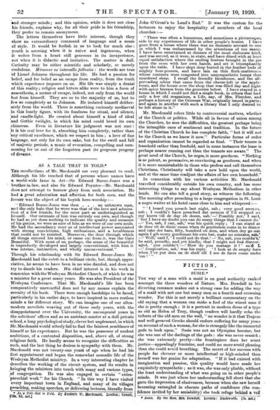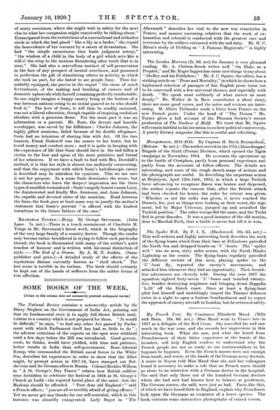FICTION.
SUSIE.*
THE way of a man with a maid is on good authority ranked amongst the three wonders of Nature. Mrs. Dowdall in her diverting romance makes out a strong case for adding the way of a maid with not one but many men as a fourth and crowning wonder. For this is not merely a brilliant commentary on the old saying that a woman can make a fool of the wisest man if she is pretty enough ; it is a portrait in modern dress of a type as old as Helen of Troy, though readers will hardly echo the tribute of the old men on the wall, "no wonder is it that Trojans and well-greaved Greeks should endure suffering for many years on account of such a woman, for she is strange,ly like the immortal gods to look upon." Susie was not an Olympian heroine, but she was one of the darlings of the gods : she was never seasick ; she was extremely pretty—the frontispiece does her scant justice—appealingly feminine, and could no more avoid pleasing than she could avo'Al breathing. The secret of her success with people far cleverer or more intellectual or high-minded than herself was her genius for adaptation. "If it had existed with imagination and passion, this quality would have made her exquisitely sympathetic ; as it was, she was only pliable, without the least understanding of what was going on in other people's minds It was just where her understanding fell short that she gave the impression of elusiveness, because when she saw herself becoming entangled in obscure paths of confidence (the con- fidence invited by her amiability) she took refuge behind a veil Susie. -By the lion; Mmm-Dowdall. London; Dackworth. 17s. seta
of misty sweetness, where she might wait in safety for the next clue to what her companion might conceivably be talking about." Emancipated from the restrictions of a conventional and orthodox circle in which she had pined "like a lily in a larder," she repaid the benevolence of her rescuers by a career of devastation. She had "the simple earnestness that leads judgment astray," "the wisdom of a child in the body of a girl which acts like a will-o'-the-wisp to the anxious floundering after truth that is in men." She had also a marvellous instinct of self-preservation in the face of any prospect of mental overthrow, and possessed to perfection the gift of stimulating others to activity in which she took no part, for she hated to see people busy. Thus for- midably equipped, she proves in the sequel "the cause of much feverishness, of the making and breaking of careers and of domestic upheavals while herself remaining perfectly comfortable. So one might imagine a happy canary being at the bottom of a war between nations owing to an initial quarrel as to who should feed it." The love of Susie, it will thus be readily surmised, was not a liberal education, though capable of inspiring credulous idealists with a generous flame. For the most part it was an infatuation or a pursuit. Mr. Rose, the devout and humble worshipper, was saved by his diffidence : Charles Johnson, the highly gifted musician, failed because of his double allegiance. Susie had no intention of sharing him with Art. Of the two hunters, Frank Dodswell was the nearer to her heart, but he loved money and comfort more ; and it is quite in keeping with the experience of life that Susie should have in the end fallen a victim to the bow and spear of the most primitive and brutal of her admirers. If we have a fault to find with Mrs. Dowdall's method, it is that her style is almost too uniformly coruscating, and that the enjoyment with which Susie's kaleidoscopic career. is described may be mistaken for cynicism. This we are sure is not her purpose. In a sense Susie dominates the scene, but the characters who leave the deepest impression are the three types of unselfish womanhood—Susie's angrily honest cousin Lucy, the disinterested and kindly Mrs. Jamieson, and Anne Johnson, the capable and devoted sister of the musician. Read between the lines, the book goes at least some way to justify the author's statement that Susie'a portrait "is offered with the kindest intentions to the future fathers of the race."



































 Previous page
Previous page